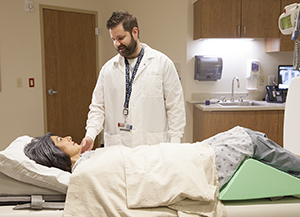X-ray Services
X-rays use radiation to quickly produce images of bones, joints, and soft tissue. BJC HealthCare offers a broad array of high-quality services, whether for a suspected fracture, persistent cough, or swallowing issue. We offer convenient access and reliable results to help you get extraordinary care.
Why choose us for X-ray services?
Our commitment to outstanding care means you can count on BJC HealthCare for prompt and accurate testing. Radiologists, some with decades of experience and many who are leaders in the field, oversee your care, and our X-ray technologists are registered with the American Registry of Radiologic Technologists®, the gold standard in certification.
Highlights of our program include:
- Advanced technology: We use digital radiography to produce clear digital images available that radiologists can review within seconds. This technology enables us to use the lowest necessary radiation dose for optimal safety. We store scans in your electronic medical record, making it easier for authorized providers to review results.
- Coordination: Our specialists collaborate to help you receive the best possible care. If an X-ray shows signs of a medical issue, we ensure quick communication of your results to your referring provider. Radiologists are available to discuss findings whenever necessary to help tailor therapies to your needs.
- Convenient walk-in services: X-ray imaging is available in some locations without an appointment if you have a physician referral. When there’s an urgent concern, such as a broken bone, services are also available at many BJC Convenient Care locations.
- Specialized assessments: Our radiography teams work closely with speech therapists to perform swallowing assessments using real-time imaging guidance. This method leads to an accurate diagnosis that addresses the source of swallowing problems so that you receive appropriate therapies.
Having an x-ray
An X-ray uses a small amount of radiation to make images of your bones and organs. X-rays are most often used to look for bone or joint problems, or to check the heart and lungs (chest X-ray). They are also used to look for any hard deposits of minerals or salts in your body, such as kidney stones. You may also have an X-ray to check for problems in the bowel such as a blockage or free air in the belly (abdomen). X-rays are also used to look for a foreign object in your body, such as metal. This can be from an injury or a swallowed object.
Tell the x-ray technologist
Tell them if you:
- Are or may be pregnant
- Had an X-ray of this part of your body before
- Have any metal objects on your body or clothes
Before your test
Before the test starts, you may be asked:
- To remove your watch, jewelry, or clothes with metal closures from the part of your body being X-rayed. These items can block part of the image.
- To put on a hospital gown
- About your overall health and any medicines you take
During your test
Here is what to expect during the test:
- You may be asked to sit, stand, or lie on a table.
- A lead apron may be draped to protect the areas of your body not being X-rayed.
- With an X-ray of your chest or belly, you may have to take a deep breath and hold it for a few seconds.
- Each exam usually needs at least 2 X-ray views. You may need to move your body before each new X-ray view.
After your test
Your healthcare provider will discuss the test results with you during a follow-up appointment or over the phone.
They may advise other imaging tests (such as an MRI or a CT scan) or more X-ray views if needed. This is done to confirm the diagnosis.
